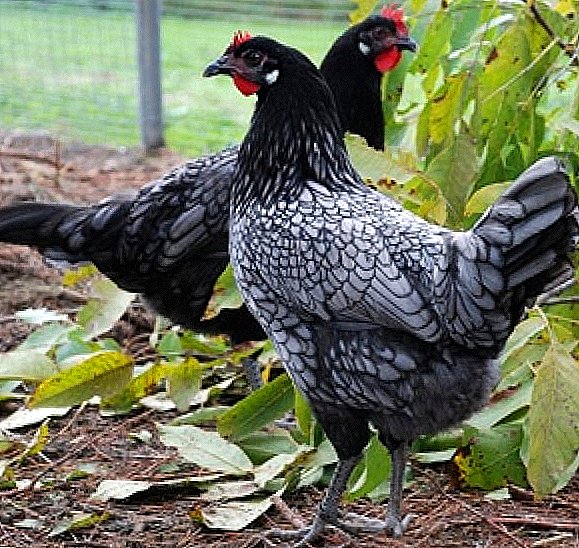
There are a number of fairly rare chickens, which want to get an inveterate livestock to their household.
Andalusian blue chickens are similar animals.
This breed is considered to be quite rare, and besides, fertile.
It is because of its “rarity” that the characteristics of this breed should be studied, since if you make some kind of silly mistake, the animals can simply die.

Andalusian blue chickens are very much appreciated by amateur zoo technicians because of their “rarity”, as well as due to their excellent exterior and good performance indicators.
These animals are almost impossible to meet in the ordinary household yard, so the most avid breeders are trying to find the young of this breed in order to grow at home.
The first representatives of this breed appeared in Spain as a result of working with the black and white hens of the Minorca breed, which were crossed with the blue cocks of the fighting breeds.
Such “parents” were chosen so that the animals turned out to be very beautiful, gave a lot of meat and eggs.
It is also interesting to read about the increase in egg production in chickens in winter.

The males of the Andalusian breed have a beautiful, strong and long body. The head of these animals is rather wide, slightly elongated, with a pronounced prominent forehead.
Have roosters very strong beakwhich is slightly bent at the end, painted in gray shades. A characteristic feature of the Andalusian roosters is a beautiful, upright comb of large sizes with pronounced barbs.
These chickens have short bristly feathers on their faces, and their skin has a red tint. Eye color can be both brown and yellow-red.
The earlobes are oval-shaped, painted in light shades. In cocks, these earrings are very soft to the touch, but outwardly they are wide and elongated. The neck of the males is also long, slightly curved closer to the head.
Thorax round shape, voluminous. The back is also quite wide, slightly inclined closer to the tail, covered with a large number of feathers. The wings are long, attached to the body high enough, almost to the back, tightly attached to the body of the animal.

The tail is slightly arched, but developed perfectly. Roosters of the Andalusian breed have beautiful, pronounced, long braids. Both the legs and feet of these roosters are long, strong.
Hocks have bluish-slate color. In hens of this breed, the scallop is tilted to one side. The remaining external characteristics of females are similar to males.
The breed has several drawbacks - any malformation of the ridge, the unevenness of the surface of the earlobes, white patina on the face, white color of the extremities.
Also in birds there may be no drawing on the feathersmay be too curved tail, deformed comb. The disadvantages include the pallor of the face and the presence of red bloom on the feathers.

These animals attract breeders with their beautiful exterior, as blue feathers are of particular value. Such animals will perfectly decorate any private yard.
Egg production in the hens of this breed is very good, for the year one female can give 180 eggs, each weighs up to 60 g.
Such good performance is usually not typical for chicken meat and egg directions, which also perform a decorative function. The meat of Andalusian chickens is very tender and tasty.
Maternal instinct in females is developed very poorly, so it is very difficult to breed young stock of this breed at home. The hen weighs 2 kg on average, and the rooster 2.5 kg. The survival rate of young stock is 93%, and adult chickens - 87%.
In the issue of care should be very careful when feeding young animals. Young Andalusian breeds can eat a lot of protein-containing feed. Therefore, in the diet of chickens, you can enter grain and mill waste, as well as meat, aimed at recycling, small potatoes and other root vegetables, greens.
It is mandatory that chickens should be given 30 g of fresh herbs every day.
The diet of Andalusian chickens is directly dependent on the season. In summer, animals need to be given wet food, which contains a lot of greenery. In the cold season, it is better for chickens to feed the compound feed with grass meal prepared on water or broth from fish or meat waste.
It is important to monitor the time of feeding the feed by young. It must be ensured that the chickens eat all the wet food in 30 minutes. In the event that the meal took less time, then the volume of food given should be increased. If the chickens have not eaten everything, then the rest of the food must be cleaned to prevent the development of pathogenic bacteria.
Andalusian chickens are very beautiful animals that combine not only a magnificent exterior, but also excellent productivity indicators.












